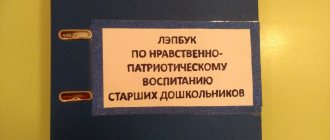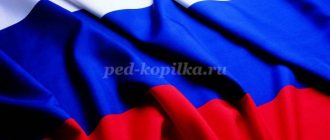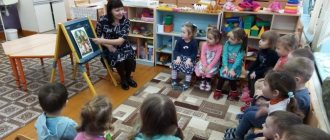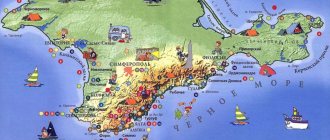I. Goal setting
Raising children, shaping a child’s personality from the first years of his life is the main responsibility of parents. The family influences the child and introduces him to the life around him. We, adults, must help children understand the importance of family, cultivate in children love and respect for family members, and instill in children a sense of attachment to family and home.
Project participants: middle school children, parents, group teachers.
Goal: to form the concept of “family” in children.
Tasks:
- To form in children ideas about the family and the profession of their parents.
- To instill in children love and respect for family members, to teach them to take care of loved ones.
- Improve the style of partnerships.
- Develop children's communication skills.
- Enrich parent-child relationships with the experience of joint creative activity.
Estimated results of the project:
- Children's knowledge of information about their family.
- Children's understanding of the importance of family in every person's life.
- The ability to organize role-playing games based on existing knowledge about the family.
- Showing care and respect to all family members.
II. Project development
- Inform project participants of the importance of this topic.
- Create a developmental environment: select materials, toys, attributes for gaming and theatrical activities; didactic games, illustrated material, fiction on the topic “Family”.
- Select material for productive activities.
- Draw up a long-term action plan.
III. Project implementation
Program section
Play activity
- Role-playing games “Family”, “Birthday”, “Shop”, “Hospital”.
- Didactic games “Who to be”, “Who needs what for work”, “Whose children?”
- Dramatization games based on the fairy tales “Little Red Riding Hood” and “Turnip”.
- Dramatizations “Three Mothers”, “A Tale for Mommy”.
- Construction games "Furniture for the home."
Cognitive development
- Thematic lessons “Rights and responsibilities in the family”, “My name”.
- Getting to know the professions of parents.
- Classification (furniture, dishes, household appliances, food).
- Creation of albums “My Family”, “Our Group”.
Speech development
- Compiling creative stories on the topic “My family”, “My pet”, “How I help at home”.
- Reading fiction on the topic “Family”: fairy tales “Sister Alyonushka and Brother Ivanushka”, “Geese and Swans”, “Cuckoo”.
- Proverbs and sayings about family.
- Conversations on the topic “What do my parents do?”
Productive activity
- Drawing on the themes “My family”, “Mom’s portrait”, “My home”.
- Making gifts for mothers, invitations, cards for family members.
- Photo exhibition “Family Hobbies”.
Working with parents
- Meetings with interesting people: Parents' stories about their profession.
- Project "Happy Day Off".
- Consultation “Mom, Dad, Me – a happy family or an unforgettable weekend.”
- Newspaper release for Mother's Day.
- The world of family hobbies: creating collections of fabrics, candy wrappers, buttons, badges, postcards.
IV. Project presentation
- Leisure “Family Evening”.
- Exhibition of projects “Happy Day Off”.
- Exhibition of drawings “My Family”.
V. Setting a new problem
- Drawing up a family tree.
Family leisure “Friendly Family Evening”
Goal: to draw attention to the family, to show its value for every person.
Tasks:
- Improve the quality of work of the kindergarten in interaction with parents.
- Strengthen attachment to your family members, form a moral attitude towards family traditions.
- Involve parents in joint activities with their children.
- Develop the creative abilities of adults and children in the process of joint activities.
- Enriching parent-child relationships with the experience of dialogic, emotionally rich communication.
Plan
- Teacher's speech.
- Presentation of “Happy Day Off” projects by parents.
- Game program for adults and children.
- Congratulations from children to their mothers.
Family is a source of inspiration, Where adults and children are nearby, In the family there is salvation from all adversity, Here everyone is responsible for each other. O. V. Tokmakova
1
Good evening, dear adults and children! We are pleased to welcome you to our meeting, which we called “Friendly Family Evening”. And today our conversation will focus on family leisure. We are looking forward to the upcoming weekend, when we can take a break from hard everyday life, from work, do our favorite thing, chat with children or get out into nature, to the countryside.
In general, a day off is an opportunity for longer communication between parents and children. The baby learns a lot of new things while walking with mom and dad around the city or going outside the city into nature. Even in the yard, a walk together will bring joy to your child: riding a bicycle, playing with a ball, outdoor games, and in winter - skating and sledding. Playing together helps children develop the skills they need to be prepared to face a challenging world in the future. In general, every family has its own traditions of spending weekends. And for those who don’t have them, it’s not too late to create them - it’s interesting and fun to spend them with your family. After all, a well-spent weekend not only contributes to the unity of all family members, but also helps the child understand how important he is to his parents, forms his connections with the outside world, and simply creates a great mood and gives a charge of vivacity for the entire working week, both for adults and and children.
2
We held a competition in the group on the theme “Happy Day Off” and now we invite you to tell us about your projects.
Parents giving presentations.
We thank the families who took part in the competition and will summarize its results a little later.
3
Now I suggest you play a little with your children. And the first joke game is called “Family Responsibilities.” You are invited to pull out a card recording your family responsibilities and find out what family responsibilities you will perform (cleaning the apartment; laundry; cooking; shopping; preparing animal feed; storing fuel; raising children; punishing children; encouraging children; the right to spending your last money; attending parent-teacher conferences; getting good grades; renovating your apartment; watching sports TV; reading newspapers; lying on the couch; reading love novels; getting your child ready for school; reading notations; having your head in the clouds).
The game “Family Responsibilities” is played.
The second competition for children is called “Guess the Fairytale Hero”.
Treats small children, Treats birds and animals, The Good Doctor looks at them through glasses... (Aibolit)
The grandmother loved the girl very much and gave her a red cap. The girl forgot her name. Well, tell me her name! (Little Red Riding Hood)
My father has a strange boy, unusual, wooden, on land and under water, looking for a golden key, sticking his long nose everywhere... Who is this? (Pinocchio)
He got tired of sitting on the window and he rolled into the forest along the path. (Kolobok)
A girl is sitting in a basket with a bear behind her back. He himself, without knowing it, carries her home. (Mashenka)
I’m an old lady no matter what: Both smart and young! With me everywhere is a rat named Lariska. (Shapoklyak)
The girl ran away from the prince so quickly that she even lost her shoe. (Cinderella)
The third competition for mothers and children is called “Gather Your Husband.” Men are like children. You have to keep an eye on them all the time. And if he’s going anywhere, he definitely needs a woman’s eye. So we propose to gather your husbands and dads:
- to work;
- to hunt;
- to the bathhouse;
- to the dacha.
Of course, their wives will collect them, and their children will help them. (Wives are given the same set of cards depicting objects that may be useful to their husbands in a given situation. Each wife “collects” her husband to one of the above listed places.)
List of things: soap; towel; washcloth; crackers; broom; electric shaver; Criminal Code; vobla; handicraft kit; jacket; boots; pen; binoculars; gun; cartridges; shampoo; towel; shovel; chainsaw; set of tools; cellular telephone; briefcase; set of linen; file; gun; handkerchief; money; flowers; toilet paper; Toothbrush; backpack; notebook.
Four families play at the same time.
The fourth competition is called “Remember the proverb about family.”
- The whole family is together... (so the soul is in place).
- A family without children, what... (a watch without a weight).
- Where there is love and advice... (there is no grief there).
- A husband without a wife is... (like a goose without water).
- What is the treasure for, if... (there is harmony in the family).
- Each hut...(its own rattles).
- A family is strong when... (one roof over it).
- Rotten the tree while it bends, teach the child... (while he listens).
- The family pot... (always boiling).
You guys are great and did a great job.
4
This weekend our country celebrates Mother's Day. The children and I also prepared congratulations for you, mother.
Children's performance.
1st child. Who is your favorite person in the world? Children will immediately say this. Go around the whole wide world, There is no better mother in the world.
2nd child. There are so many mothers here and there: The frog has a mother, And the chicken has a mother, And the calf has a mother. But the best one is mine!
Dramatization "Three Mothers"
A girl plays with a doll.
Girl: Oh, you’re a daughter, daughter Masha, You haven’t eaten your porridge again, Stop upsetting your mother (points to yourself), Let’s not go for a walk again (shakes a finger).
The girl's mother enters.
Mom: Tanya, put away the toys, get out your pillow. Stop upsetting your mother (points to himself), You should be sleeping soundly. Is everything in the briefcase? Everything is fine? Don't forget your notebooks tomorrow! (shakes his finger).
Grandma comes in. The girl leaves the doll and takes the pillow. Grandmother and mother step aside.
Grandmother: Sveta, you washed the dishes, you forgot to put the cups in the closet. And she scolded the child, Better give her a blanket! Stop upsetting your mother (points to himself), I had to clean everything up (shakes his finger).
Girl: It’s not easy to be mothers, And I’ll tell you straight: At any age, we all need our mother!
Fairy tale for mommy
Narrator: An ordinary hedgehog lived in the forest near the lawn. One day an extraordinary story happened to him. Look: The hedgehog went out onto the lawn... and saw Flowers.
Hedgehog: Fr-fr... hello, flowers, fr-fr... Flowers: Good afternoon... Good afternoon... Hedgehog: Let's go, please, congratulate... fr-fr... my mom on the holiday. Flowers: We agree, yes, yes, yes... But how to get there? Narrator: Suddenly a Fox jumped out into the clearing. It's so big. She saw the Hedgehog and said: Fox: What a delicious yum-yum... Meeting yum-yum... I'm um-am for you now... Hedgehog: Ay, fr-fr, I'm afraid! Help! Narrator: Only the Flowers were not afraid, but quickly surrounded the Hedgehog and hid him from the Fox. This is how the Hedgehog turned into a flower meadow. The Fox looked for the Hedgehog among the Flowers, did not find it, and ran on. And when the hedgehog came home, his Mom said: Mom: What beautiful Flowers, but where is my beloved Hedgehog? Narrator: Then the Hedgehog came closer, kissed Mom - and said this: Hedgehog: And I’m here, fr-fr, happy holiday to you, mommy!
3rd child. I will give my mother a flower for the holiday, I will make this daisy myself. Mom will wake up and see a flower. He will say: “What a miracle you are, son!”
Children give their mothers flowers made with their own hands.
And now the last task awaits you. You have drawing materials on your tables. And now, together with your children, we invite you to depict your family on the palm of your hand. While you are drawing, we will sum up the results of the competition. Awarding families for creativity, for a modern approach, for imagination, for originality, for skill, for sincerity and other nominations.
We wish you many more happy weekends!
MAGAZINE Preschooler.RF
Patriotic education in the middle group (work experience)In modern conditions, when profound changes are taking place in the life of society, patriotic education is becoming one of the central areas of work with the younger generation. Now, in a period of instability in society, there is a need to return to the best traditions of our people, to its age-old roots, to such eternal concepts as clan, kinship, and Motherland. The feeling of patriotism is multifaceted in its content: it is love for one’s native places, pride in one’s people, a feeling of inseparability with others, and a desire to preserve and increase the wealth of one’s country. At each age stage, manifestations of patriotism and patriotic education have their own characteristics.
During the period of primary and secondary preschool age, high social motives and noble feelings develop. How they are formed in the first years of a child’s life largely determines his entire subsequent development. During this period, those feelings and character traits begin to develop that already invisibly connect him with his people, his country. The roots of this influence are in the language of the people that the child learns, in folk songs, music, games, toys, impressions about the nature of his native land, about the work, life, morals and customs of the people among whom he lives.
By patriotic education of children, we understand the interaction of an adult and children in joint activities and communication, which is aimed at revealing and forming in the child universal moral qualities of the individual, familiarization with the origins of national and regional culture, the nature of the native land, nurturing an emotionally effective attitude, a sense of belonging, attachment to others.
The goal of instilling patriotism in children of middle preschool age is to develop in them the need to do good deeds and deeds, a sense of belonging to the environment and the development of such qualities as compassion, empathy, resourcefulness, and curiosity.
The tasks of patriotic education of children of middle preschool age include:
- formation of a spiritual and moral attitude and a sense of belonging to one’s home, family, kindergarten, city, village
- the formation of a spiritual and moral attitude and a sense of belonging to the cultural heritage of one’s people;
- formation of a spiritual and moral attitude towards the nature of the native land and a sense of belonging to it
- nurturing love, respect for one’s nation, understanding one’s national characteristics, self-esteem as a representative of one’s people, and a tolerant attitude towards representatives of other nationalities (peers and their parents, neighbors and other people).
The content of patriotic education of children of middle preschool age in our group is revealed as follows:
- introducing children to cultural heritage, holidays, traditions, folk applied arts, oral folk art, musical folklore, folk games through learning folk outdoor games, staging and telling nursery rhymes and jokes to children.
- acquaintance with family, history, family members, family traditions; with the kindergarten, its children, adults, games, toys, traditions; with city, village, coat of arms, landmarks. He is very actively involved in the organization of various photo exhibitions on the topics: “Me and my mother” , “Best memories of summer holidays” , design of a subject-development environment - a patriotic corner, family albums, albums of village sights and the features of our kindergarten)
- organization of creative, productive, playful activities for children, in which the child shows compassion and care for people, plants, and animals in different seasons of the year. Participation of children in short-term projects “Feed the birds in winter” , “How to please a friend” , “Young helpers of nature” , etc.
One of the components of patriotism is the cultivation of love for native nature. Gradually, children form ideas about their native village, their native land. Nature becomes closer and clearer, children try to do something for it, and feel a sense of responsibility towards it. And it is precisely these qualities that are manifested in children when participating in the long-term project “My Motherland-Samara Territory” , which began in the 2nd junior group with the project “Animals of our region” and continued in the middle group with the project “Birds of the Samara Territory”
Interaction with parents
Of particular importance when solving the problems of patriotic education is close contact with the student’s family. Parents provide great assistance and actively participate in the life of the kindergarten, showing creativity, imagination, and enthusiasm. With their help, exhibitions of drawings and crafts are held. With great pleasure they take part in creative competitions for patriotic education. In such as “Village Coat of Arms” , “Folk Doll” . Help with project activities.
Patriotic education is carried out in all areas of our work with children: in familiarization with the environment and with fiction, speech development, music, and fine arts.
| Next > |
Middle group. Junior preschool age. Children 4 - 5 years old
Lesson notes for the middle group “Getting to know the state symbols of Russia” Lesson notes for the middle group “Getting to know the state symbols of Russia”
.
Goal: Acquaintance with state symbols (coat of arms, flag, anthem)
Objectives: • To give children a basic understanding of the flag: to introduce the colors of the flag, the symbolic meaning of the colors...
Lesson on the world around the middle group “Our army is dear” Summary of lesson in the middle group No. 1 on the world around us “Our army is dear”
Section: Familiarization with the surrounding world.
Topic: “Our army is dear”
Goal: developing an idea of the characteristics of military service. Objectives: to clarify ideas about the branches of the military, about the defenders of the Fatherland...





